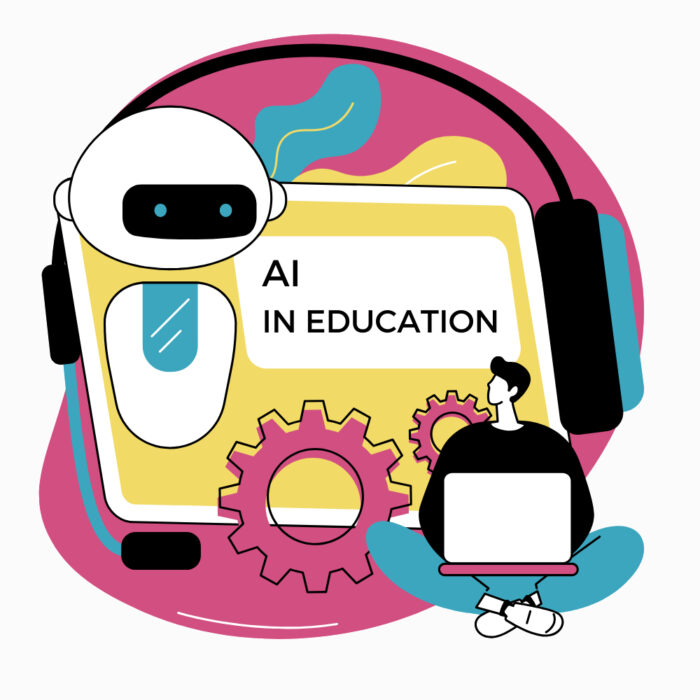AI in Education: Considerations for Schools
Artificial Intelligence systems and tools are already part of our everyday lives. As AI continues to evolve, it is important to be aware of the benefits and the risks it can have in teaching and learning.
This technology has the potential to transform education, so it is important for educators and students to understand how to ethically, critically and positively engage with AI in order to make the most of its potential. It’s important to note that AI can compliment, but not replace a teachers’ expertise. The human element a teacher brings to the classroom will still be crucial to fostering meaningful learning experiences.


What are the benefits for educators?
Time-Saving on Administrative Tasks: AI can automate time-consuming administrative tasks like grading, attendance tracking, and data management.
Generating High Quality Educational Resources: AI can assist in generating high-quality education materials and resources, helping teachers identify new and relevant content.
Provide Data Analysis and Insights: AI systems can quickly analyse large amounts of data, and provide insights into student performance and progress, enables teachers to identify areas for support and improvement.
What are the benefits for students?
Personalised Learning: AI can tailor educational content and pace to individual students’ needs and abilities. It provides customised learning experiences, helping students grasp concepts at their own pace and style, thereby improving comprehension and retention.
Immediate Feedback: AI-powered systems can provide instant feedback on assignments, quizzes, and tests.
Accessibility and Inclusivity: AI tools can assist students with disabilities by providing accessible materials, such as text-to-speech or speech-to-text capabilities. These technologies help create a more inclusive learning environment, ensuring that every student has equal access to education.

What are the challenges and concerns?
Data Privacy and Security: AI systems collect and analyse a significant amount of personal data from students and educators. Ensuring the privacy and security of this data, as well as protecting against potential breaches, is a significant concern.
Ethical Use of AI: Educators and developers need to consider the ethical implications of AI in education, such as bias in algorithms, misinformation, copyright issues, and plagiarism. Striking a balance between AI-driven innovation and responsible use is essential.
Access to Technology: Not all students have equal access to technology and AI-driven resources. Students can be disadvantaged if they don’t have access to AI tools or the necessary technology.
Teacher and Student Over Reliance: There is a risk that teachers and students may become overly dependent on AI for teaching and learning, potentially diminishing critical thinking skills and personal interaction in the classroom.
Bias: As generative AI uses algorithms created by human designers, there is a strong potential for the introduction of bias into the system. Bias occurs where results or outputs from an AI system are disproportionately in favour of or against an idea, group or person.
Some examples include providing only a limited perspective, showing racial and gender biases. As generative AI uses large data sets, historical and systemic biases are introduced into the system. AI bias is similar to human biases and can lead to inaccurate decisions. The issue of AI bias arises when an algorithm draws conclusions that are too narrow or based on training datasets that do not accurately reflect the population under study.
Inaccuracy: As generative AI draws from large data sets, it is not guaranteed to be accurate as not all information on the internet is accurate. AI is only as good as the data that is fed into the machine learning algorithms. Additionally, generative AI is not necessarily coded to provide accurate information, rather it simply predicts the type of information needed to best fit a given Prompt.
Plagiarism: A common concern from educators is that generative AI and other AI technologies will be used by students to write essays and complete assignments.
Copyright/ Licensing Unknowns: Understanding copyright laws is an important element of using generative AI and other AI technology in the classroom, in that as this is new technology, there are not clear boundaries regarding who owns the content generated by AI. As companies continue to develop licenses on their products, it is important for educators to reflect on the implications of copyright/licensing unknowns.
Considerations for Schools on the Safe and Ethical Use of AI
Getting Started
Understanding AI:
It’s essential for educators to have a foundational understanding of what AI is and how it works. This will help schools make informed decisions about its application in the educational setting. https://www.oidetechnologyineducation.ie/artificial-intelligence-in-schools/
Identify Clear Objectives:
Determine what specific educational goals you want to achieve with AI. Whether it’s improving personalised learning, automating administrative tasks, or enhancing assessment methods, having clear objectives will guide your AI implementation.
Choose appropriate tools
There are lots of AI tools available with different functions. It is important to be mindful of the potential risks and prioritise online safety when introducing digital technology in the classroom for example age restrictions on LLM’s (Google Gemini is 16+, Copilot (formally Bing chat) is 13+, Chat GPT is 18+, however, 13+ can use it with parental permission). Here are some important considerations before introducing a new app or technology to the classroom: https://www.webwise.ie/trending/considerations-for-introducing-a-digital-tool-app-into-the-classroom/.
Training and CPD
Ensure that all educators are trained to understand the potential for bias in AI.
Provide training to educators, learners, and families (e.g. digital literacy) to support in critical thinking skills and fact checking for misinformation, disinformation, and within generative AI responses.
Sign up for the NEW Oide Technology in Education AI for Schools Course: https://www.oidetechnologyineducation.ie/onlinecourses/ai-for-schools/
Keep up to date with training developments here: https://www.oidetechnologyineducation.ie/artificial-intelligence-in-schools/
Accessibility and Inclusivity
Ensure that AI tools are accessible to all students, including those with disabilities.
School Policy
Develop strong policies that include when and how generative AI can be used in the classroom. See Webwise AUP Hub.
Ensure any use of AI is compliant with school policy, including AUP, privacy, data security, student safety and data ownership.
Ensure that the AI systems you use are compliant with relevant regulations and that student and teacher data is protected. Communicate your data policies to all stakeholders.
Involve a diverse group of stakeholders, including teachers, parents, and students, in policy development.
It is important to carry out regular policy reviews to keep up with technological and regulatory changes.
Effective Use of AI
Set clear expectations for use of AI and be clear on what skills are being addressed.
Create more opportunities for learners to problem solve, analyse and share their thinking in classroom settings.
Be sure to discuss the potential risks of using AI with learners (e.g. inaccurate information, hallucinations, bias, etc.) and provide learners with digital literacy and citizenship lessons so that they understand these risks.
Support learners in sharing their writing process e.g. discussing how and where they got their information and their strategy for integrating it into their drafts. Creating discussion opportunities in addition to having learners turn in drafts of their writing along the way in order to show that the process is equally as valuable as the product can be helpful in creating strong writers and researchers.
Digital Citizenship
Use the Webwise resources to teach learners digital citizenship and information literacy skills.
Talk with learners about the potential biases of AI in addition to teaching strong research and digital literacy skills to ensure that if generative AI is used, it is done so with an understanding that it is a first step rather than a final step with the most importance being placed on the human user in verifying the information presented.
If using generative AI in the classroom, ask learners to find other sources that support the information provided by generative AI in order to check for accuracy.
Highlight resources to parents/guardians and carers on the safe and ethical use of AI. Keep parents and caregivers informed about the use of AI in the classroom. https://www.webwise.ie/parents/
Training
NEW Short introductory (term-time) course on AI for Schools
https://www.oidetechnologyineducation.ie/onlinecourses/ai-for-schools/
Introduction to AI Post-Primary: https://vimeo.com/941669310
An Introduction to AI for Post-Primary Teachers on Vimeo
Explainer Guides
https://www.webwise.ie/news/guest-article-ai-explained-what-is-ai/
https://www.webwise.ie/parents/explainers/explained-what-is-chatgpt/
https://www.webwise.ie/parents/explainers/explained-what-is-snapchats-my-ai/
https://www.webwise.ie/news/casting-the-net-what-do-teens-need-to-know-about-chatgpt/
https://www.webwise.ie/news/explained-what-are-deepfakes/
https://www.webwise.ie/news/you-are-what-you-like-the-influence-of-online-algorithms/
Resources
AI in Schools: https://www.oidetechnologyineducation.ie/artificial-intelligence-in-schools/
Dig Tech – AI in Education: https://vimeo.com/830531096
Persuasive Design: https://www.webwise.ie/connected/persuasive-design-lesson/
Facial Recognition: https://www.webwise.ie/connected/facial-recognition-lesson/
Connected: https://www.webwise.ie/connected/
All Aboard for DigiTown – A learning path for 9 -12 year olds to become smart digital citizens.
Artificial Intelligence – Five Considerations for Teacher Use
Other Resources
Ethical Guidelines on the Use of AI and Data in Teaching and Learning for Educators
https://op.europa.eu/en/publication-detail/-/publication/d81a0d54-5348-11ed-92ed-01aa75ed71a1/language-en


